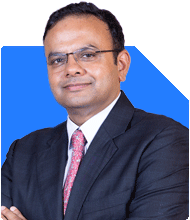Samraat Jadhav |2498 Answers |Ask -Follow
Stock Market Expert - Answered on Sep 18, 2023
He is a SEBI-registered investment and research analyst and has over 18 years of experience in managing high-end portfolios.
A management graduate from XLRI-Jamshedpur, Jadhav specialises in portfolio management, investment banking, financial planning, derivatives, equities and capital markets.... more

plz suggest my portfolio for long term and suggest if any changes required. , astral 12 nos , bhartiartl 24 nos, cams 16 nos , cdsl 6 nos datapattns 27, deepakfert 57
Disclaimer: Investments in securities are subject to market RISKS. Read all the related documents carefully before investing. Please consult your appointed/paid financial adviser before taking any decision. The securities quoted are for illustration only and are not recommendatory. Registration granted by SEBI, membership of BASL and certification from NISM in no way guarantee performance of the intermediary or provide any assurance of returns to investors.
You may like to see similar questions and answers below
Ajit Mishra | Answer |Ask -Follow
Answered on Dec 03, 2020
Ulhas Joshi |280 Answers |Ask -Follow
Mutual Fund Expert - Answered on Jun 02, 2023
Advait Arora | Answer |Ask -Follow
Financial Planner - Answered on Nov 22, 2023
Samraat Jadhav |2498 Answers |Ask -Follow
Stock Market Expert - Answered on Aug 31, 2023
Abhishek Dev | Answer |Ask -Follow
Financial Planner - Answered on Sep 01, 2023
Dr Shyam Jamalabad |106 Answers |Ask -Follow
Dentist - Answered on Dec 05, 2025
Dr Dipankar Dutta |1836 Answers |Ask -Follow
Tech Careers and Skill Development Expert - Answered on Dec 05, 2025
Ulhas Joshi |280 Answers |Ask -Follow
Mutual Fund Expert - Answered on Dec 05, 2025
Dr Dipankar Dutta |1836 Answers |Ask -Follow
Tech Careers and Skill Development Expert - Answered on Dec 04, 2025
Ravi Mittal |676 Answers |Ask -Follow
Dating, Relationships Expert - Answered on Dec 04, 2025
Anu Krishna |1745 Answers |Ask -Follow
Relationships Expert, Mind Coach - Answered on Dec 04, 2025
Anu Krishna |1745 Answers |Ask -Follow
Relationships Expert, Mind Coach - Answered on Dec 04, 2025
Mayank Chandel |2562 Answers |Ask -Follow
IIT-JEE, NEET-UG, SAT, CLAT, CA, CS Exam Expert - Answered on Dec 04, 2025
Mayank Chandel |2562 Answers |Ask -Follow
IIT-JEE, NEET-UG, SAT, CLAT, CA, CS Exam Expert - Answered on Dec 04, 2025
Mayank Chandel |2562 Answers |Ask -Follow
IIT-JEE, NEET-UG, SAT, CLAT, CA, CS Exam Expert - Answered on Dec 04, 2025



























